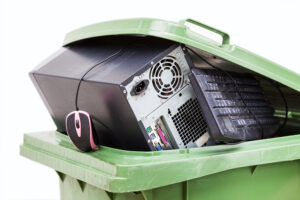Technology has fundamentally changed the way we live, work and interact with each other.
We are always connected in this ‘mobile first’ world, and this has placed an unprecedented reliance upon our devices, so much so that we cannot function productively or, more importantly, live happily without them.
While our dependency, and business investment, in technology continues to accelerate, all while being magnified by the pandemic, businesses are falling behind trying to tackle the footprint of our ever-growing tech obsession.
As the world’s largest full-service tech protection and support provider, we are constantly digging into this issue to see how it is evolving. This is so we can help accelerate the solutions we provide to our customers, who are some of the biggest tech retailers in the world. In turn, they can provide this solution to their customers.
Why is sustainability at the bottom of the list of business priorities?
It’s staggering the fortunes businesses spend investing in the latest technology for their staff to enable productivity. Yet, there isn’t a plan or strategy for disposing of their tech in a sustainable way, or a way that enables these perfectly good devices to have a second life.
Businesses should act now, by implementing the right tech policies and sustainable practices. This has the potential to make a significant impact in cutting carbon emissions, tackling e-waste, protecting our planet, all while benefitting the balance sheet.
As a society, we have a proven track record of doing this well
In the UK we have learned to reduce food waste, recycling and reusing paper materials, giving old clothes to charity shops and clothes banks, all as examples – but we are still struggling to do the same with technology.
We conducted research which found that 60% of UK businesses have no plans to adjust what they are doing around tech upgrades or electronic waste disposal. Which means, that instead of devices being rehomed and given a second life they are being stored away. In fact, our research found that one fifth (22%) of business senior decision makers dispose of unwanted technology in landfills or leave it idle in storage or in the office.
With many UK businesses planning to phase out more devices in the next five years, this issue of tech disposal is only going to increase. Not only is improper disposal contaminating land, but there are well-working devices going to waste, when they could otherwise be hugely valuable to many other people. It’s no wonder the UK is on course to become the biggest contributor to rising e-waste levels in Europe over the next three years, according to independent research carried out by Spring.
We know that UK businesses are facing mounting pressure to find ways to demonstrate that they are taking real action on their sustainability commitments. Almost every business has an ESG statement on their website, with committed goals for ten years’ time. But, in all honesty, this isn’t until those senior executives who made pledges have retired. The real question is, do those companies have current and realistic plans to make the necessary progress now?
We can help them to do just that, by protecting, repairing, recommercing, we extend the lifecycle of devices and reduce waste. We think mobile phones should have at least two owners in its lifetime, and we have been able to rehome 94% of devices we receive. We want other businesses to embrace our philosophy—keeping more devices in people’s hands and out of landfills.
Implementing the right sustainable practices early on can make long-term differences in significantly cutting carbon emissions. There are three elements to achieving a sustainable approach to tech.
Tech protection; by insuring devices, you ensure that with any breakage, the repair costs don’t outstrip the replacement – meaning your existing device won’t get swapped out for a new one. If people insured their devices, then if it does get damaged its far more affordable to get repaired then buying a new one.
We created a remote diagnostic app because so many people thought their devices were broken when in reality there was nothing wrong with them. Normally they just needed a software refresh or a bit of user training. This also meant an environmental cost of posting devices back and forth – creating airmiles and emissions. Be willing to take your device in to be diagnosed instead of discarding of it this not only saves you money, but saves the planet.
Trading in your old device – makes your new device more affordable. Through our partner programmes alone, we rehome 95% of the devices we receive – a massive feat. This ensures that unused devices are kept out of landfill through repair and replacement actions that simultaneously help businesses meet their sustainability commitments. This does not only tackle the problem of the rising corporate tech footprint but simultaneously benefits the balance sheet and allows business to adapt a more progressive thinking around their technology use.
We live in a disposable society where we are all super-reliant on our devices. When they go wrong many of us have been guilty of resorting to buying a new replacement quickly because we cannot function without them. People are overlooking the many replacement and repair services that are available, at the detriment of their pockets and the planet.
We must encourage all businesses to run their operations as sustainably as possible, operating out of green buildings, using a high proportion of clean energy and all the things that good companies should be doing today. Alongside this, we need to continue to educate people, especially business leaders, about sustainable consumerism of our technology.
We have to learn how to tackle our green tech footprint in the same way that we have learned how to recycle plastics, tackle food waste, and simple options available to protect the planet by insuring, repairing, recommercing tens of millions of devices every year.
